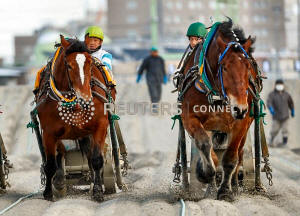Olympics: Hokkaido's farmhorse
jockeys dream torch relay can spur racing revival
 Send a link to a friend
Send a link to a friend
[March 17, 2020]
By Ju-min Park
OBIHIRO, Japan (Reuters) - At Obihiro
racetrack, spectators walk alongside the course as fast as the big
beasts they've backed to win, cheering as they go. There's no
sprinting in this contest: The adrenaline charge is all about power
- pure, 1-tonne horse power.
The Obihiro track is for 'ban'ei keiba', traditional racing
featuring giant farmhorses on Japan's northernmost island of
Hokkaido. Every Saturday, Sunday and Monday, the horses pull sleds
that equal their own tonne in weight, guided by a jockey, along a
200-metre sand track - with two mounds to climb along the way.
This June, a new attraction is set to grace Obihiro. The Olympic
torch is to be carried down the track by one of the heavy horses, as
part of the flame's relay tour of Japan before arriving in Tokyo for
the Summer Games.
Tetsuya Satou, general manager of the racecourse, is counting on the
arrival of the torch in June to bring new attention to the sport.
"This is a real honor ... The relay using an animal is not happening
elsewhere in the whole country," said Satou.
That attention could be much needed for an ageing sport in serious
decline.
Ban'ei - meaning 'pull' - racing began around 1900 as contests among
Hokkaido farmers showing off the strength of their horses. After
World War II, it was turned into a sport, complete with rules,
betting and four tracks.
But as popular tastes have changed, crowds have dwindled and Obihiro
is now the last track in operation. The number of jockeys fell to 19
in 2018 from 28 in 2013, data show.
Still, supporters say the unique nature of the sport offers a key to
its survival.
"Climbing up obstacles is something different from regular horse
races," said Kouhei Kaneta, a 26-year-old fan explaining the
attraction on a recent visit to Obihiro.
Sakae Katsumata, a 72-year-old retired carpenter from Obihiro, has
been coming to the races for 50 years.
[to top of second column] |

Jokceys and 'Banei' horses compete during their 'Banei' Keiba race,
a form of farm horse racing, at Obihiro 'Banei' horse Race Track in
Obihiro, Hokkaido, Japan February 24, 2020. REUTERS/Issei Kato

"This is the only race of its kind in the world, there's a chance to
attract people from overseas," Katsumata said, adding that he had
seen Chinese and Korean tourists at the track despite recent
declines in visitor due to the coronavirus epidemic.
The virus has hit Hokkaido particularly hard, with the number of
infected people the highest in Japan. Authorities have asked ask
residents to avoid outdoor activities.
Tours of the track's backyard and early morning training sessions
have been suspended for weeks. Races without spectators will
continue until March 24, when the track takes an annual one-month
break, although online betting is still possible.
Looking ahead to June, Takumi Fujimoto, a 58-year-old jockey, said
he would jump at the chance to carry the Olympic torch on a sled
pulled by a star of the Obihiro track.
"Nothing specific has been decided yet, but if I'm chosen, then,
yes, I will do it," said Fujimoto.
"This may never happen again."
(Reporting by Ju-min Park; Editing by Antoni Slodkowski and Kenneth
Maxwell)
[© 2020 Thomson Reuters. All rights
reserved.] Copyright 2020 Reuters. All rights reserved. This material may not be published,
broadcast, rewritten or redistributed.
Thompson Reuters is solely responsible for this content. |